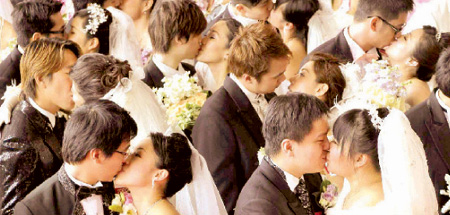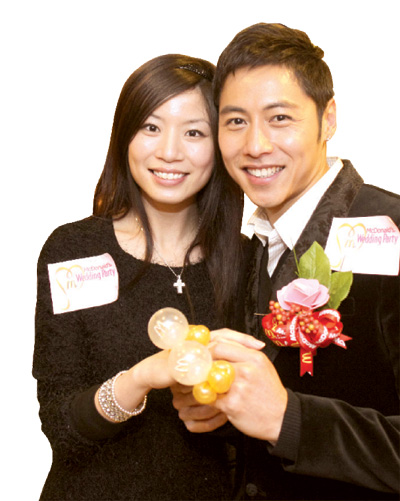A city of lonely hearts
Updated: 2011-02-24 07:02
By Hazel Parry(HK Edition)
|
|||||||
|
Fifty Hong Kong couples rehearse a group wedding at a shopping mall in East Kowloon on May 23, 2010. Hong Shaokui / CNS |
|
Ashley Tse (left) and Kelvin Kwong pose as they announce their engagement before guests during a Valentine's day engagement party at a McDonald's fast food restaurant on Feb 14, 2011. Ed Jones / AFP |
If you spent Valentine's Day last week on your own, take comfort from the fact that you're in good company. Hong Kong is home to a growing population of single people who are destined never to marry - and most of them are women. Hazel Parry reports on how Hong Kong became such a lonely city.
Marketing Executive Jenni Liu is a woman with the world at her feet. She has a good degree, a job with excellent prospects, and the financial acumen to rival a character in the movie Wall Street.
She has a clear idea of what she wants from life and how she will achieve it. She is a woman with a plan. One thing that is noticeably missing from that plan however, is a man. Like thousands of Hong Kong women, Jenni is single.
Figures from the Census and Statistics Department reveal that in 2009, 985,500 of the city's 7 million people were women who have never married, compared to 753,600 in 1996 and 662,100 in 1986 - a rise of almost 50 percent. By contrast, the number of single men has grown much less dramatically at 988,700 in 2009, compared to 847,100 in 1996.
This works out at 889 men for every 1,000 women in Hong Kong today - a significant change from 1981 when the men outnumbered the women with 1,087 for every 1,000 women.

For women like Jenni in their 30s - the decade when most girls plan to settle down and wed - the situation is more extreme with only 720 men for every 1,000 women. And experts believe the future of Hong Kong women looks increasingly single with some projections claiming that by 2036 there will be only 709 men for every 1, 000 women.
This growing number of single women is coupled with a change in culture which leads many young people to leave the nest earlier rather than wait for marriage, meaning there are now more people living alone than ever before.
Official figures show that in 1986 there were less than 9,000 women aged between 30 and 49 living alone in Hong Kong. Ten years later that number had tripled to more than 32,000. Fast forward another decade to 2006 and that figure had soared to 75,000.
The number of men aged 30-49 living alone has also increased, albeit not so drastically, from 46,500 in 1986 to 83,850 in 2006.
That's a lot of people who, although not necessarily lonely, are alone, says Paul Yip Siu-fai, a demographics expert holding a doctorate in the Department of Social Work and Social Administration at the University of Hong Kong.
According to Yip, Hong Kong's gender imbalance is not mother nature's doing, but rather the result of migration and an influx of female one-way permit holders from the Chinese mainland.
"We have more women not by birth but by migration and that is something that has happened over the last two decades," says Yip.
"If the percentage difference between the sexes is only within about 5 percent or so, it is not so bad. But if, as in Hong Kong, we are talking about a difference of about 12 or 15 percent, depending on whether we include domestic helpers, then there is a problem.
"When you have this kind of imbalance, the chance of Hong Kong ladies marrying Hong Kong men is less.
"The propensity of never-married is increasing. About two decades ago, about 3 percent of women remained single after age 45, now we are talking about something like 20 percent of women staying single for their lifetimes.
"Currently, there are around 88 men for every 100 women. But I see it getting worse and I won't be surprised if it goes down to 70 men per 100 women."
This growing army of single women could have implications for the whole of Hong Kong, says Yip, affecting a wide range of things such as size of apartments, how supermarkets package goods and even public policy and politics.
"If you are single and do not have a lot of money, who is going to look after you when you are old? The burden will fall on the government," says Yip.
"A gender imbalance is something that not only affects personal experience. It affects the community as a whole and it is the community that will have to embrace the new challenges that arise out of this increasing number of singletons."
Yip says there are two hurdles which women looking for partners have to face in Hong Kong: the competition from women from the Chinese mainland, and an overload of work pressure which leaves them little time to go out and meet people.
"Every year we are losing up to 20,000 marriageable men to cross border marriages. Demand is larger than supply and competition is fierce.
"Even though the percentage of women marrying mainland men has gone up, the actual number is still quite low compared to the number of men marrying mainland women."
It makes finding a partner a daunting task for young women, says Yip.
This is a view shared by professional matchmaker Mei Ling Ng.
"It's becoming increasingly difficult for women to find husbands and not just in Hong Kong but worldwide and especially so in large cities like Hong Kong, London and New York,.
"People have different priorities, life is too busy, too hectic, there is too much travelling, too little time," says Ng, the author of How to Find a Husband.
In her book, Ng says competition for husbands is fierce, and comes from two directions. First, she says there is the army of 300,000 domestic helpers looking to secure a better life, and second there are the "tenacious" mainland women "conniving to steal our men".
"These truly formidable competitors are usually educated, attractive, aggressive, sexy and quite without scruples when it comes to hunting down a man," she says.
There is also the fact that local women are brought up to be "good girls" and concentrate on studies and careers rather than dating boys like "naughty girls", she says.
"Sure enough, all the good girls got top grades. But it's the naughty girls who got themselves top husbands," says Ng.
Likewise, these good girls are often strong, high achievers, hard working and a "tad intimidating" for men who prefer women to be less powerful and successful, says Ng.
Yip says Hong Kong women also tend to set their sights high, looking for partners who are of higher standing both in terms of career, intelligence and social standing.
"Hong Kong women are very educated, sophisticated, they still want to marry up. They are in the manager levels with PhDs and there is no one up there for them.
"Men on the other hand like to marry down. This not only happens in Chinese culture, it happens in Western culture too."
Faced with the daunting prospect of too few fish in the sea, wheresmydate.com.hk founder Toby Jones suggests women take action - something he feels is already happening.
"I certainly feel women are getting more empowered, they want to take charge and that there is growing acceptance of things like internet dating, singles nights and speed dating," says Jones.
"The days of sitting in a bar and waiting for Mr or Mrs Right to walk in, getting married and living happily ever have disappeared."
Jones believes, like any big city, Hong Kong is a city of lonely hearts but says there are plenty of opportunities for people to meet someone.
"If you peel back the layers and ask people and they are brutally honest, I think you would be surprised how many lonely people there are out there, and that goes for all the big cities.
"But anything in life is as difficult as you want to make it. You can sit there and complain there are no single girls around because they are all chasing the guys at the IFC (International Finance Centre), or there are no guys because they're going after Filipino girls.
"But that's a real cop out. I think people who say that just don't want to make the effort because no one wants to look like they're chasing someone.
"When people complain to me about being single, I say what are you doing about it? There is so much going on in Hong Kong. You have to be proactive and get out there."
Yip and matchmaker Mei Ling Ng also agrees that being proactive is the best tactic for the single girl looking for a man.
"I always tell my students not to sit and wait for something to happen. They have to go out and improve themselves for whatever comes along in life," says Yip.
"There is no point working from 8am until 8pm and then coming home, eating dinner and going to bed. You won't find anyone that way.
"I also feel we need to create friendlier working environments that give people more time off more to increase their chances of meeting someone.
"The saying goes: Work hard and play hard. But in Hong Kong the young work so hard that they are just too exhausted to play."
Yip hopes in the future as people get more mobile, travel will open up new dating horizons giving Hong Kong singles to escape the gender imbalance.
But for the thousands of women currently single for whom that day will come too late, Yip has some advice.
"For women who have missed the boat, who have reached 35 or 40 and not found someone they like and the chance of them remaining single is high, they need to prepare themselves mentally and physically," he says.
"Mentally, they should accept whatever they are and enjoy their lives. Physically, they need to make sure they can look after themselves and save a bit of money. They need to accept they can't depend on a man coming along to support them."
(HK Edition 02/24/2011 page4)

